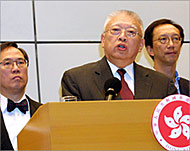Hong Kong govt to amend divisive bill
Hong Kong leader Tung Chee-hwa bowed to popular protests on Saturday and said he would amend three controversial sections of an anti-subversion bill.
 |
| Tung accommodates popular concern |
Tung said “substantial” amendments would be made to the three sections that have aroused the most concern both locally and in the international community.
Provisions enabling the government to outlaw organisations proscribed in China such as the Falun gong spiritual group and another conferring on police the power to conduct searches without a warrant would be deleted, he said.
In addition, the government will strengthen safeguards to freedom of the press. Journalists who disclose Chinese state secrets will be able to defend themselves by saying they are acting in the public interest.
No delay
However, Tung insisted the national security bill would be submitted to the Legislative Council for a final vote on 9 July as scheduled, despite mounting pressure on officials to delay its passage until December to allow time for more consultation.
Hundreds of thousands of protesters took to Hong Kong’s streets on Tuesday to denounce the anti-subversion law in the city’s biggest demonstration in over a decade.
The protesters feared it would trample basic human rights and that dissent would have been treated the same way as in mainland China.
Fearing that Hong Kong could be used as a base for subversive activities against it, China has been pushing Tung to enact the legislation. Hong Kong’s post-colonial constitution, agreed to by Beijing and London, requires a national security law to be passed, but does not set out a timetable.